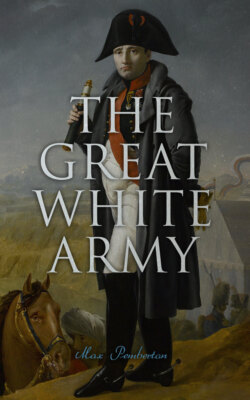Читать книгу The Great White Army - Pemberton Max - Страница 6
На сайте Литреса книга снята с продажи.
II
ОглавлениеWe entered the house itself by a wicket upon the left-hand side, which should have led to the kitchens.
It was here, perhaps, that I thought it not a little extraordinary, and it may be somewhat less than prudent, that I, who should have been already at the gates of the palace, had turned aside at the mere nod of this dandy to enter a house of whose people I knew nothing. Nevertheless, it was the case, and I reflected that if one of my own countrymen were indeed in distress, then was the delay not ill-timed.
We were at the foot of a cold stone staircase by this time, and I observed that the lackey began to mount it with some caution. There was no sound in the house, and when presently we emerged in the gallery of a vast hall the place had all the air of a church which has been long closed.
Here for the first time I discovered the purpose for which I had been brought to the place. A man lay dead upon the flags of the gallery, and it was clear that he had died by a bullet from the pistol which was flung down at his side.
Thousands of men had I seen die since we crossed the River Niemen, yet the sight of this mere youth lying dead upon the flags afflicted me strangely. Perchance it was the great cold hall, or the dim light which filtered through its heavy windows, or the silence of that immense house and all the suggestions of mystery which attended it. Be it as it may, I had less than my usual resource when I knelt by the young man's side and made that brief examination which quickly convinced me that he was dead. The dandy, meanwhile, stood near by taking prodigious pinches of snuff from a box edged with diamonds. His unconcern was remarkable. I could make nothing of such a picture.
"Who is this youth?" I asked him.
He shrugged his shoulders and took another pinch of the snuff.
"One of your own countrymen, as I say—an artist from Fréjus who is in the service of my lord, the prince."
"How did he die, then?"
The dandy averted his eyes. Then he said:
"I returned from the great square ten minutes ago and found him here. You can see as well as I that he shot himself."
"That is not true," I rejoined, looking at him sternly. "Men do not shoot themselves in the middle of the back!"
He was still unconcerned.
"Very well, then," he retorted; "someone must have shot him." And almost upon the words he turned as white as a sheet.
"Listen," he cried in a loud whisper; "did you not hear them?"
I listened and certainly heard the sound of voices.
It came through an open door at the far end of the gallery and rose in a sharp crescendo, which seemed to say that men were quarrelling.
"Who is in the house?" I asked the fellow.
"I do not know," he said gravely enough. "There should be no one here but ourselves. Perhaps you will be good enough to see. You are a soldier; it is your business."
I laughed at his impudence, and having looked to the priming of my pistol, I caught him suddenly by the arm and pushed him on ahead of me. Justly or not, it had flashed upon me that this might be a trap. Yet why it should be so or what it had to do with a surgeon-major of the Guards I knew no more than the dead.
"We will go together," said I; and so I pushed him down the corridor.
My presence seemed to give him courage. He entered the room with me, and before a man could have counted three he fell headlong with a great gash in his throat that all the surgeons in the French army could not have stitched up.
This was a memorable scene, but I was to witness many a one like it in those days of rapine and of pillage to come.
We had entered a lofty room, the furniture of which would not have been out of place in the Emperor's palace at Paris. Most of it, indeed, was French, and some of the cabinets were such as you may see to this day both in the Tuileries and at Fontainebleau. So much I observed at a glance, but infinitely of more import at the moment was the tenants of the room. Three greater ruffians I have never seen in any city of Europe; neither men so dirty and ill-kempt nor so ferocious in their mien. All wore ragged sheepskins and had their legs bare at the knee. They were armed with knives and bludgeons, and two of them carried torches in their hands. Instantly I saw that these were three of the convicts whom the governor had released. They had come to sack the house, and they would have killed any who opposed them as a butcher kills a sheep. But for the dead man at my feet, I could have laughed aloud at their predicament when they suddenly realised that a soldier and not a civilian must now be dealt with. It was just as though their valour went ebbing away in a torrent.
I struck the first man down with the butt end of my pistol, and, fearing the effect of a shot, drew my sword and made for the others who held the torches. They fled headlong, slamming the heavy door at the far end of the room behind them—and there was I alone with the dead, and the house had fallen again to the silence of a tomb.
